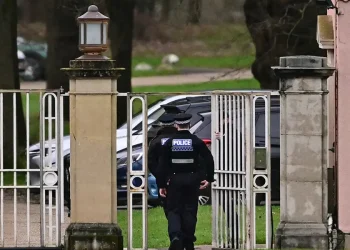The trial of Wall Street Journal reporter Evan Gershkovich ended Friday with his conviction on espionage charges that he, his employer and the U.S. government have dismissed as fabricated. He was sentenced to 16 years in prison.
Here’s what we know about the secretive process.
It took place in the Sverdlovsk Regional Court in the city of Yekaterinburg, about 880 miles (1,416 kilometers) east of Moscow. That’s the city where Gershkovich was arrested in March 2023, while on a reporting trip.
The session was closed. Gershkovich was in court for the verdict and stood in the glass defendants’ cage wearing a dark colored sweater. His head was shaved, just as it was at the start of his trial in June. It is not known whether he chose to shave it or whether he was forced to.
The judge sentenced Gershkovich to 16 years in a maximum security penal colony. The judge asked Gershkovich if he understood the verdict and he replied in Russian, “yes your honor.” The judge asked if he had any questions and Gershkovich replied “no, your honor.”
As the press cameras were leaving court, someone shouted out “we love you Evan.”
Gershkovich, the American-born son of immigrants from the USSR, is the first Western journalist arrested on espionage charges in post-Soviet Russia. Russian authorities, without presenting evidence, claimed he was gathering secret information for the U.S.
The State Department has declared him “wrongfully detained,” thereby committing the government to assertively seek his release.
The Journal’s publisher, Almar Latour, and Emma Tucker, its top editor, called it a “disgraceful, sham conviction,” in a statement after the verdict. “Journalism is not a crime, and we will not rest until he’s released. This must end now,” Latour and Tucker said.
A top White House spokesman also called the proceedings “nothing more than a sham trial.”
“Evan has never been employed by the United States government. Evan is not a spy. Journalism is not a crime. And Evan should never have been detained in the first place,” White House national security spokesman John Kirby said Wednesday. “Russia has failed to justify Evan’s continued detention. He, like fellow American Paul Whelan, is simply being used as a bargaining chip.”
Gershkovich’s arrest came about a year after President Vladimir Putin pushed through laws that chilled journalists, criminalizing criticism of Russia’s war in Ukraine and statements seen as discrediting the military. Foreign journalists largely left the country after the laws’ passage, but some have trickled back in. There are concerns about whether Russian authorities would target them as animosity between Moscow and Washington grows.
After the verdict, Gershkovich is expected to taken back to the detention facility in Yekaterinburg where he was held during the trial. Both the prosecution and defense have 15 days to appeal the sentence. If there’s no appeal, Gershkovich will be transferred back to prison.
If there is an appeal, Gershkovich will probably stay in Yekaterinburg until there is another hearing.
The process of transferring him can last days or even months, and it may only be clear where Gershkovich will serve his sentence once his lawyers are told that he has arrived at a prison.
Although Russia-U.S. relations are at their lowest point since the Cold War, the countries negotiated a swap in 2022 that freed WNBA star Brittney Griner, who had been serving a 9 1/2-year sentence for cannabis possession. Griner was exchanged for arms dealer Viktor Bout, who was imprisoned in the U.S.
The countries also traded Marine veteran Trevor Reed, who serving nine years in Russia for assaulting a police officer, and Russian pilot Konstantin Yaroshenko, who’d been serving a 20-year prison sentence for conspiring to smuggle cocaine.
Russian President Vladimir Putin hinted that he would be open to swapping Gershkovich for Vadim Krasikov, a Russian serving a life sentence in Germany for the 2019 killing in Berlin of a Georgian citizen of Chechen descent. However, Germany’s willingness to cooperate is uncertain.
It could be months or years. Russian officials previously said a swap can only happen after a verdict, but it depends on when Moscow and Washington can reach a deal. Past experiences differ drastically.
Griner was exchanged about four months after her verdict. Reed was released in a swap 21 months after his. Paul Whelan, an American convicted of espionage in 2020 and sentenced to 16 years in prison, is still waiting.









 American Dollar Exchange Rate
American Dollar Exchange Rate